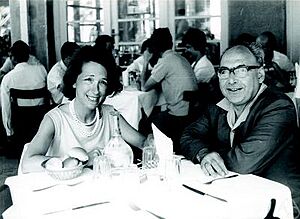Alfréd Rényi facts for kids
Quick facts for kids
Alfréd Rényi
|
|
|---|---|
 |
|
| Born | 20 March 1921 Budapest, Hungary
|
| Died | 1 February 1970 (aged 48) Budapest, Hungary
|
| Alma mater | University of Szeged |
| Scientific career | |
| Fields | Mathematics |
| Institutions | Eötvös Loránd University |
| Doctoral advisor | Frigyes Riesz |
| Doctoral students | Imre Csiszár Gyula O. H. Katona János Komlós András Prékopa Gábor Székely Janos Galambos |
Alfréd Rényi (born March 20, 1921 – died February 1, 1970) was a famous Hungarian mathematician. He is best known for his work in probability theory, which is about understanding chance and randomness. He also made important contributions to other areas of math, like combinatorics (counting and arranging things), graph theory (studying networks), and number theory (studying numbers).
Contents
Life Story of Alfréd Rényi
Rényi was born in Budapest, Hungary. His father was an engineer, and his mother's father was a well-known philosopher.
Early Life and Challenges
In 1939, Alfréd was not allowed to go to university because of unfair laws against Jewish people at that time. However, he managed to enroll at the University of Budapest in 1940 and finished his studies in 1944.
During World War II, he was forced to join a special labor service. He bravely escaped from this service and hid for six months using fake papers. There's an amazing story about him: he got a soldier's uniform and used it to help his parents escape from the Budapest Ghetto, where they were held captive. This act showed incredible courage and smart planning.
Education and Family
After the war, Rényi earned his PhD (a very high university degree) in 1947 from the University of Szeged. He then continued his advanced studies in Moscow and Leningrad (now St. Petersburg), where he worked with a famous Soviet mathematician, Yuri Linnik.
In 1946, Rényi married Katalin Schulhof, who was also a mathematician. Their daughter, Zsuzsanna, was born in 1948.
Building a Legacy
After teaching for a short time in Budapest, he became a professor at the University of Debrecen in 1949. A year later, in 1950, he started the Mathematics Research Institute for the Hungarian Academy of Sciences. This institute, which now carries his name, became a very important place for math research. He led it until his early death. He also led the Department of Probability and Mathematical Statistics at the Eötvös Loránd University starting in 1952. He became a respected member of the Hungarian Academy of Sciences.
Rényi's Mathematical Work
Alfréd Rényi made many important discoveries in mathematics.
Number Theory Discoveries
He used a method called the large sieve to prove something important about even numbers. He showed that every even number can be written as the sum of a prime number (a number only divisible by 1 and itself) and another number that is made by multiplying together only a few prime numbers. This was a step towards solving the famous Goldbach conjecture, which says every even number greater than 2 is the sum of two prime numbers. The Goldbach conjecture is still unsolved!
Understanding Information
In information theory, which is about how we measure and understand information, Rényi created new ways to measure "information" or "surprise" in data. These ideas are used today to understand how varied or diverse different things are. He also helped create the Rényi–Ulam game, which is a guessing game where some of the answers might be wrong.
Parking Problems and Random Graphs
Rényi is also known for his "parking constants." These numbers help solve a fun math problem: If cars park randomly on a street, how much space is wasted? He found that random parking is about 25% less efficient than if cars parked perfectly.
He worked with another famous mathematician, Paul Erdős, on 32 different papers. One of their most well-known works introduced the Erdős–Rényi model of random graphs. These models help us understand networks (like social networks or the internet) where connections are made randomly.
Famous Sayings
Alfréd Rényi was known for some interesting quotes:
- He loved coffee and is often quoted saying: "A mathematician is a device for turning coffee into theorems." This quote is sometimes mistakenly given to Paul Erdős.
- He also famously said: "If I feel unhappy, I do mathematics to become happy. If I am happy, I do mathematics to keep happy." This shows how much he loved his work.
His Lasting Impact
The Alfréd Rényi Prize is given by the Hungarian Academy of Science in his honor.
The Mathematics Research Institute that he founded in 1950 was renamed the Alfréd Rényi Institute of Mathematics in July 1999, showing his lasting legacy in the world of mathematics.
Books by Alfréd Rényi
- A. Rényi: Dialogues on Mathematics, Holden-Day, 1967.
- A. Rényi: A diary on information theory, Akadémiai Kiadó
- A. Rényi, Foundations of Probability, Holden-Day, Inc., San Francisco, 1970.
- A. Rényi, Probability Theory. American Elsevier Publishing Company, New York, 1970.
- A. Rényi, Letters on Probability, Wayne State University Press, Detroit, 1972.
His books Foundations of Probability and Probability Theory have been reprinted by Dover Publications, making them available to more people.
See also
 In Spanish: Alfréd Rényi para niños
In Spanish: Alfréd Rényi para niños
 | Misty Copeland |
 | Raven Wilkinson |
 | Debra Austin |
 | Aesha Ash |

